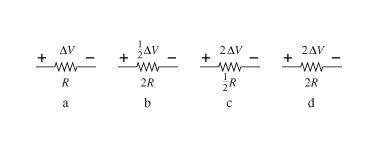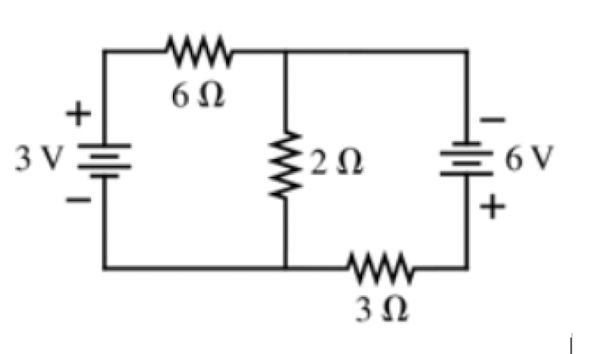a) What is the resistance of the lightbulb while it's on?
b) Calculate how many kWh the lightbulb uses in 1 hour.
a) 240 ohms
R = V^2 / P
(120)^2/60
b) .060kWh
E = P*t = (60W)(1Hr) / 1000
A battery with internal resistance is connected to a load resistance. If it is increased, does the terminal voltage of the battery increase, decrease, or stay the same?
The voltage of the real battery increases
(It has a smaller drop off)
Vbat = Remf/(R+rin)
A capacitor is discharged through a 100-ohm resistor. The discharge current decreases to 25% of its initial value in 2.5 ms. What is the value of the capacitor?
C = 18uF
Rank in order from largest to smallest, the powers of each resistor
PC >PD>PA >PB
Rank the Resistors Resistance
IC > IA = ID >IB
What value resistor will discharge a 1.0uF capacitor to 10% of its initial charge in 2.0 ms?
R= .87kila-omhs
A)What is the resistance of a 1500W (120V) hair dryer?
B)What is the current in the hair dryer when it is used?
A) 9.60omhs
R=(v)^2/P
B)12.5A
I = V/R
For the circuit shown, find the current through and the potential difference across each resistor.
Table
R V A
3 6 2
4 4 1
6 4 .67
7 14 2
12 4 .33
The switch has been closed for a very long time.
What is the charge on the capacitor?
The switch is opened at t=0s. At what time has the charge on the capacitor decreased to 10% of its initial value?
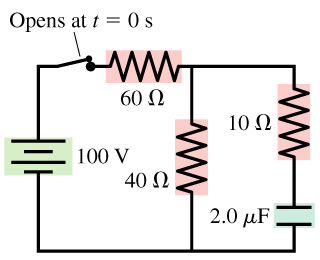
1. Q=VC -> 80uC
2. .23ms
ln(.10)= -t/(50)(2.0uf)
A car’s starter motor consumes 3.8 kW of electric power.
a) How much current does the motor draw from the 12 V car battery?
b) How much charge is delivered to the motor in the 2.0 s it takes to start?
A) 3.2*10^2 A
I = P/V
B) 6.38*10^2 C
q = I*time
Find the current through and potential difference across each resistor for the circuit shown. Place your results in a table for ease of reading.
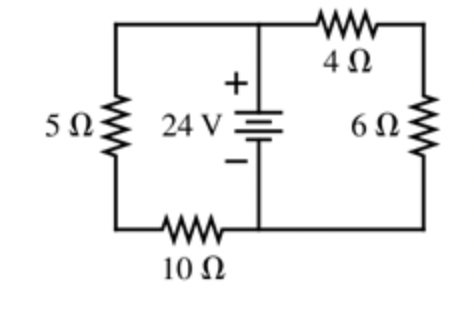
table
5 8 1.6
10 16 1.6
6 14.4 2.4
4 9.6 2.4
A 150uF defibrillator capacitor is charged to 1500 V. When fired through a patient’s chest, it loses 95% of its charge in 40 ms. What is the resistance of the patient’s chest?
89 omhs
0.050= e-t/rc
solve r
What power is dissipated by the 2-ohm resistor?
W= 1.1W
Loop Law
I3 = .75A
P= I2R
What is the current through the 10-ohm resistor? Is the current from left to right or right to left?
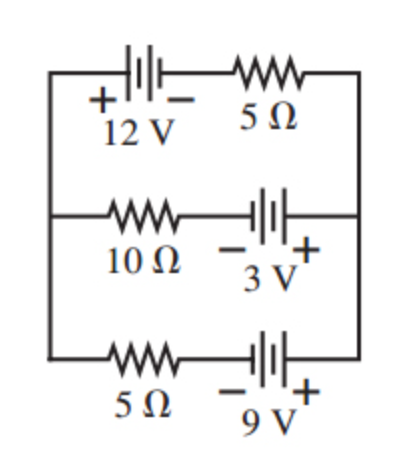
I = .36A
left to right
You’ve made the finals of the Science Olympics! As one of your tasks, you’re given 1.0 g of aluminum and asked to make a wire, using all the aluminum, that will dissipate 7.5 W when connected to a 1.5 V battery. The density of aluminum is 1.0*10-3kg. What length and diameter will you choose for your wire?
r = .243mm
L =2.0m
Work
P=V^2/R => R
R = pL/A => L =(3.366*10^7m^-1) * r^2
Density / Volume => 1.0*10^-3 / pi * r^2 * L = r^2*L = 1,179*10^-7
system of equations
L= 2.0m,r =.243mm
